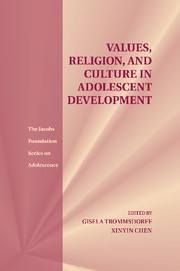Book contents
- Values, Religion, and Culture in Adolescent Development
- Series page
- Values, Religion, and Culture in Adolescent Development
- Copyright page
- Dedication
- Contents
- Contributors
- Preface
- Acknowledgments
- Part One Theoretical Perspectives on Values, Religion, and Adolescent Development in Cultural Context
- Part Two Universal and Culture-specific Functions of Adolescent Values and Religion
- Part Three Impact of Values and Religion on Adolescent Adjustment in Times of Social Change
- 9 Marginalized Japanese Youth in Post-industrial Japan
- 10 Adolescent Cultural Values and Adjustment in the Changing Chinese Society
- 11 With God’s Help
- 12 Religion’s Role in the Development of Girls’ Occupational Aspirations
- 13 First Romantic Relationships of Adolescents from Different Religious Groups in Israel and Germany
- Part Four Socialization Processes of Values and Religion in Adolescent Development
- Index
12 - Religion’s Role in the Development of Girls’ Occupational Aspirations
from Part Three - Impact of Values and Religion on Adolescent Adjustment in Times of Social Change
Published online by Cambridge University Press: 05 September 2012
- Values, Religion, and Culture in Adolescent Development
- Series page
- Values, Religion, and Culture in Adolescent Development
- Copyright page
- Dedication
- Contents
- Contributors
- Preface
- Acknowledgments
- Part One Theoretical Perspectives on Values, Religion, and Adolescent Development in Cultural Context
- Part Two Universal and Culture-specific Functions of Adolescent Values and Religion
- Part Three Impact of Values and Religion on Adolescent Adjustment in Times of Social Change
- 9 Marginalized Japanese Youth in Post-industrial Japan
- 10 Adolescent Cultural Values and Adjustment in the Changing Chinese Society
- 11 With God’s Help
- 12 Religion’s Role in the Development of Girls’ Occupational Aspirations
- 13 First Romantic Relationships of Adolescents from Different Religious Groups in Israel and Germany
- Part Four Socialization Processes of Values and Religion in Adolescent Development
- Index
Summary
In this chapter we explore the influence of religion on female adolescents through the use of both nationally representative, longitudinal survey data and semi-structured, in-person interviews from the National Study of Youth and Religion. Our results suggest that growing up in a religious family, especially those involved in religious institutions, may result in an increased identification with femininity and a heightened emphasis on care, leading to preference for more female-dominated jobs like teaching, nursing, and other medical assistant type work. Adolescent girls (ages 16–21) express a preference for these careers over business, science, or other male-dominated (and more highly paid) professions while directly referring to a personal desire for an altruistic, rewarding, and “family friendly” career track. These gendered career aspirations sort girls into limited career tracks early in their educational lives and often well before family formation processes begin, likely contributing to continued gender inequality in educational and career attainment. Although occupational aspirations are thought to be primarily products of social class and ability, we argue that cultural forces such as religion provide a system of meaning and values that shape how girls imagine their futures.
- Type
- Chapter
- Information
- Values, Religion, and Culture in Adolescent Development , pp. 271 - 289Publisher: Cambridge University PressPrint publication year: 2012
- 1
- Cited by



